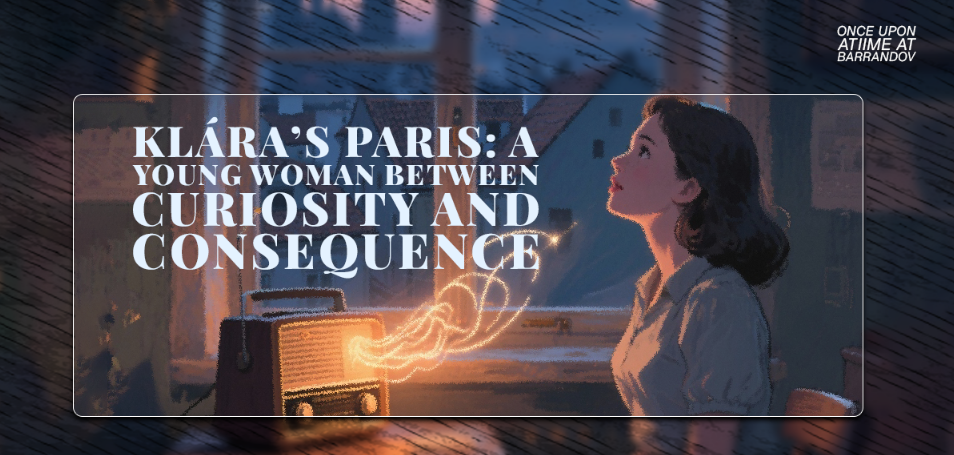Klára Wagnerová’s trajectory is the emotional spine of Once Upon a Time at Barrandov. In a handful of scenes — a Paris bakery, an editorial meeting at Květy, and her nervous arrival at Barrandov — the manuscript traces a young woman’s hunger for experience and dignity, and the costs that can follow when private life brushes against public suspicion.
The Paris opening is deliciously small-scale: Klára exhausted, tempted by shoes and macaroons, receiving a baker’s gift. That tender episode is not filler; it’s symbolic. In a city tremulous with student upheaval, a Czechoslovak student experiences freedom’s tang and the same moment that draws admiration also draws attention. When an accidental photograph later circulates, it becomes evidence in a bureaucracy primed to find trouble. A private joy turns into a political reference point.
Back home, Klára’s first professional steps at Květy show her idealism bumped against editorial control and ideological expectation. Her small essays — about pastries, about Parisian kindness — are read not as human observations but as indicators of taste and influence. The editor’s fury and her immediate dismissal are a reminder of how cultural institutions can police taste to enforce conformity; a light piece about macaroons becomes a political misstep.
Her father’s presence — the gift of a Montblanc pen, the quiet counsel, the mixture of pride and worry — is the novel’s moral anchor. The manuscript treats family moments not as domestic aside but as a counterpoint to public danger. These scenes anchor Klára’s choices; they show how courage can be cultivated by small, loving gestures and how those gestures become tools for survival.
The book’s larger point emerges through Klára’s personal narrative: when politics and art elbow into everyday life, young people learn quickly that curiosity carries consequences. Klára’s sting from being fired is not only about losing a job — it is a coming-of-age lesson about how creative impulses must be navigated within a system that rewards caution. Yet she does not give up. The manuscript traces her resilience: networking at Barrandov, trying to find a place to write about film, and learning the craft of persistence under constraint.
There is also a larger metaphor at play in Klára’s story. Her adventures — from Paris to editorial rows to Barrandov offices — mirror Czechoslovakia’s own flirtation with openness and the abrupt costs of that flirtation. Where the nation experiments with speech, a young woman experiments with voice. Where politics clamp down, a career is stalled. Klára’s small losses and modest triumphs are a microhistory of an era.
Yet the manuscript does not reduce Klára to victimhood. Her curiosity, bravery, and talent persist; the reader watches her learn to write for film, to find allies like Ota Hofman, and to keep the pen her father gave her as a symbol of possibility. The novel closes the gap between personal desire and political reality with tenderness: Klára’s story is a tribute to the small, stubborn ways people keep their inner lives alive even when the world insists on a different script.
In the end, Klára is a reminder that history is made of ordinary choices: which words to write, when to speak, and for whom. Her life in the manuscript teaches that the ordinary — macaroons, pens, a published piece — can become extraordinary precisely because of what it risks.
Stay tuned: Once Upon A Time AT Barrandov


